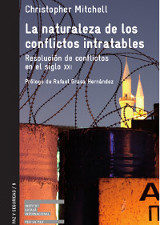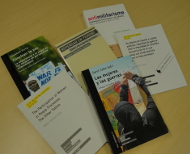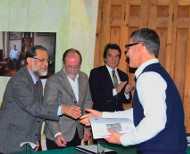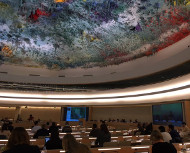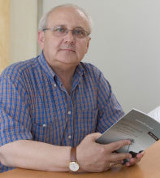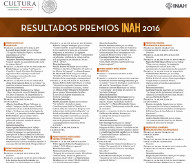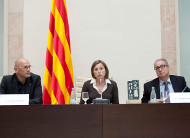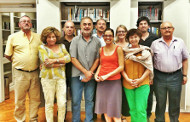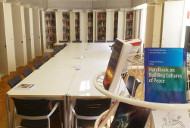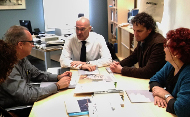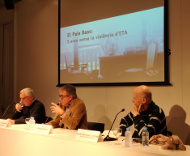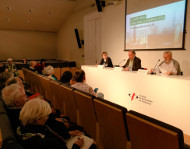In this book Mitchell sets out to answer how and why societies become involved in prolonged, violent and intractable conflicts, and what can be done about it. To answer these questions, the author addresses various aspects such as the nature of violence in human behavior, what is meant by intractable conflicts, and the different phases involved in ending conflicts: prevention, mitigation, regulation of violent behavior, institutionalization, termination mechanisms and reconciliation.
As ICIP president Rafael Grasa points out in the prologue to this edition, “The Nature of Intractable Conflict: Resolution in the Twenty-First Century” is bound to become an essential resource in the study and practice of conflict resolution and transformation. Based on Mitchell’s remarkable career in this field, this book is a valuable contribution to the analysis of social conflicts and how to intervene in them, since it demonstrates that it is possible to deal with so-called intractable conflicts.
Christopher Mitchell has degrees in History and International Relations, and is Professor Emeritus at the School for Conflict Analysis and Resolution at George Mason University (USA). Mitchell has also been a visiting professor at several universities, including the United Nations-mandated University for Peace, and is a member of numerous academic associations related to conflict analysis and resolution and peace research.
Author: whads
ICIP fosters research on Women and Peace
May 24th is the International Women’s Day for Peace and Disarmament, a date meant to remind us of the violence that women suffer during armed conflicts and post conflict situations and, also, to vindicate their active participation in peace negotiations and the prevention of conflicts, and their activism.
Coinciding with this commemorative date, ICIP has elaborated a compendium of materials and publications produced by the Institute which tackle the topic “Women and Peace”. It includes different publications, exhibitions and audiovisuals, as well as the resources on the work of women for peace available at the ICIP Library, specialized in peace, security and conflicts.
Publications
a) Documents and Reports:
– Women, Peace and Security. 15 years of the UN Security Council Resolution 1325. Report by Maria Villellas (2016).
– Dones, Pau i Seguretat: 15 anys de la resolució 1325 de les Nacions Unides. Proceedings of the conference that took place in Barcelona in November of 2015 (in Catalan).
– The international agenda on women, peace and security: a review of the first 15 years of resolution 1325 and proposals for action in Catalonia. ICIP Policy Paper by Maria Fanlo, Sabina Puig and Elena Grau (2106).
– La verdad de las mujeres. Víctimas del conflicto armado en Colombia. Report coordinated by the “Ruta Pacífica de Mujeres Colombianas” with the collaboration of the ICIP. (2014). Published in Spanish.
– La memoria histórica, ¿activo transformador de la desigualdad de género? Análisis crítico del discurso del Centro de la Memória Histórica en Colombia a partir de una mirada de género e interseccionalidad. ICIP Working Paper by Marta Grau (2013). Published in Spanish.
– Historical memory in Colombia. Towards a public policy from a gender perspective. ICIP Policy Paper by Marta Grau (2013).
– De Madres de Soacha a sujetas políticas: capacidad de agencia ante la impunidad en Colombia. ICIP Working Paper by Rocío Mateo Medina (2013). Published in Spanish.
– Los crímenes de naturaleza sexual en el Derecho Internacional Humanitario. Report by Magdalena M. Martín and Isabel Lirola (2013).
– La participació de les dones en els processos de pau. Les altres taules. ICIP Working Paper by Maria Villellas (2010).
– Reflexiones sobre la categoría de víctima de violencia política con mirada de género. Report by Maria Truñó (2010). Published in Spanish.
b) Peace in Progress e-magazine
– Women, Peace and Security: 15 years of 1325 Resolution. Peace in Progress, number 25. November 2015.
– Pacifist feminism. Peace in Progress, number 22. February 2015.
– Women building peace. Peace in Progress, number 6. December 2010.
c) Books
– Las mujeres y las guerras. Carol Cohn (ed.). “Paz y Seguridad” collection, ICIP and Edicions Bellaterra (2015). Published in Spanish.
– Antimilitarisme. Dinàmiques polítiques i de gènere dels moviments per la pau, by Cynthia Cockburn. “Noviolència i lluita per la pau” collection, ICIP and Pagès editors (2014). Published in Catalan.
– Violencia sexual y conflictos armados, by Janie L. Leatherman. “Paz y Seguridad” collection, ICIP and Edicions Bellaterra (2013). Published in Spanish.
– Construir la paz: la experiencia y el papel de las mujeres en perspectiva internacional, by Elisabeth Porter. “Paz y Seguridad” collection, ICIP and Edicions Bellaterra (2012). Published in Spanish.
– Repensar en femení, by Agneta Söderberg Jacobson. “Eines de pau, seguretat i justícia” collection, ICIP and Icària Editorial (2010). Published in Catalan.
Exhibitions
– Paraules descalces. Dones fent Pau, by Dani Lagartofernández. The exhibition can be complemented with the documentary Om Mohammad.
Audiovisuals
– Conference “Women, Peace and Security: 15 years of UNSCr 1325”.
– Dones construint la pau a Israel i Palestina (First Part). In Catalan.
– Dones construint la pau a Israel i Palestina (Second Part). In Catalan.
Continuing with the commitment to promote the work done by women for peace, ICIP also granted the ICIP Peace in Progress Award 2012 to the Mothers of Soacha (Colombia) and the ICIP Peace in Progress Award 2014 to WILPF (Women’s International League for Peace and Freedom).
Research project funded by ICIP wins new award in Mexico
Ignacio Iturralde’s dissertation Comunidades encadenadas. Análisis de la cultura política y el caciquismo en un distrito de Oaxaca (1915-2014) has received the Jan de Vos Award for best doctoral thesis in the history of South-East Mexico, granted by the Centro de Investigaciones y Estudios Superiores en Antropología Social (CIESAS) and the Colegio de la Frontera Sur (ECOSUR) in Mexico. Iturralde received an FI-ICIP research grant for novice researchers to conduct this thesis.
For this same dissertation, Iturralde was granted the 2016 INAH Award last September, an award presented annually by the Ministry of Culture of the Government of Mexico.
While working on his doctoral thesis, Iturralde published the paper Autonomy, Community and Caciquismo: Ethnicity, Social Control and Violence in a Mixe Village in Oaxaca, Mexico in the ICIP Working Paper collection (published also in Spanish).
Annual Meeting of the Network on Business and Conflict in Geneva
The annual meeting of the International Research Network on Business, Conflict and Human Rights (BCHR Network) will be held in Geneva on Thursday 17 November. This network, led by ICIP and formally established a year ago, brings together members from universities, NGOs and relevant research centers in the field of armed conflict and peacebuilding from around the world. Participants include, for example, the universities of Georgetown, Quebec, Sorbonne, Leiden, Greenwich, Ottawa and Australia; and centers and foundations such as SIPRI, Fafo, the International Committee of the Red Cross, Global Witness, PeaceNexus and DCAF.
The creation of the network is part of ICIP’s action program “Armed conflicts: law and justice”, coordinated by the Professor of Public International Law Antoni Pigrau. The main objective of this network is to investigate the causes, dynamics and consequences of the activities of companies in situations of armed conflict, the impact of this participation on human rights, and the legal liabilities that may arise thereof.
World-renowned speakers, such as Surya Deva, member of the UN Working Group on Business and Human Rights, and Sarah Joseph, director of the Castan Centre for Human Rights Law in Australia, will be participating in this second annual meeting, along with about forty registered attendees. Case studies of Palestine, Iraq and Colombia will be presented and, as a new feature, the negative externalities of companies’ impact on the environment will be addressed. The meeting, organized by ICIP in collaboration with DCAFG, will be held in Geneva to coincide with the United Nations Forum on Business and Human Rights, which will take place that same week and in which an ICIP delegation will also be participating.
The initiative to create a research network of this nature arose in the autumn of 2011, when ICIP organized the first international seminar on business and armed conflict in Barcelona, with the intention of creating a common agenda in this subject. The seminar continued to take place, with subsequent editions held in Barcelona, in 2013; in London, in 2014; and in Geneva, in 2015.
Vicent Martínez Guzmán, new vice president of ICIP
The ICIP Governing Board, meeting on Tuesday 13 December, chose Vicent Martínez Guzmán, PhD in Philosophy and Honorary Director of the UNESCO Chair of Philosophy for Peace, as the new vice president of the institution, a position that had been vacant since the resignation of Antoni Pigrau in July.
The election of vice president concludes the renewal of the ICIP Governing Board, led by Xavier Masllorens and composed of ten members: seven chosen by Parliament (Cécile Barbeito, Carme Colomina, Vicent Martínez Guzmán, Xavier Masllorens, Oscar Mateos, Magda Oranich and Antoni Pigrau) and three appointed by the Government (Carme Garcia, David Minoves and Manel Vila).
Research project funded by ICIP wins award in Mexico
Ignacio Iturralde’s dissertation Comunidades encadenadas. Análisis de la cultura política y el caciquismo en un distrito de Oaxaca (1915-2014) (Chained Communities: Analysis of Political Culture and Caciquismo in a District of Oaxaca, Mexico (1915-2014)) has received the award for best doctoral thesis during the 2016 INAH Awards, presented annually by the Ministry of Culture of the Government of Mexico. Iturralde received an FI-ICIP research grant for novice researchers to conduct this thesis.
While working on his doctoral thesis, Iturralde published the paper Autonomía comunitaria y caciquismo: identidad étnica, control social y violencia en una comunidad mixe de Oaxaca (Autonomy, Community and Caciquismo (Ethnicity, Social Control and Violence in a Mixe Village in Oaxaca, Mexico) in the ICIP Working Paper collection.
Father Joan Botam receives the ICIP Peace in Progress Award
On Tuesday, April 12, ICIP presented the 2015 Peace in Progress Award to Capuchin friar Joan Botam, promoter of numerous initiatives linked to peace and ecumenism, at a ceremony that took place at the Parliament of Catalonia. He received the award for being one of the main proponents of pacifism in Catalonia and a strong advocate of interfaith dialogue and religion as a source of peace.
The ceremony was chaired by the President of the Parliament, Carme Forcadell, the Minister of Foreign Affairs, Institutional Relations and Transparency, Raül Romeva, and ICIP president Rafael Grasa. It was attended by the honoree and by numerous representatives of various religious and spiritual traditions of Catalonia, including the Archbishop of Urgell and the co-Prince of Andorra, Joan Enric Vives.
Over a hundred people were in attendance. The opening speech was delivered by ICIP president Rafael Grasa, who highlighted the characteristics that make Father Botam deserving of the ICIP Award: “The ability to show the multiple interconnected dimensions of peace, the coherence of his ethical, religious and civic convictions, his great ability to generate dialogue (…) and his fruitful work in favor of interfaith dialogue.” Then professor and activist Arcadi Oliveres commented on Botom’s personality, in a speech in which he described the Capuchin friar as a peacemaker “with a conscience, willpower, ability and commitment,” an “exceptional pioneer of interfaith dialogue” and a person “who we can be grateful to for introducing us to peace without adjectives.”
A video about Joan Botam was screened during the event and the Capuchin friar received the award from the President of the Parliament. In his word of thanks – read by his friend Joaquim Vilar – Father Botam underlined the numerous ties he has maintained with peace, from his childhood to his entry in the Catalan Capuchin order, his participation in Pax Christi or his role in the events of the “Caputxinada,” in 1966. “Peace is the great utopia that grabs and seduces you,” he said. And he defended peace as a means to being “more grass roots, more democratic, more of a builder.” Botam dedicated the award to his family, the Capuchin community and Catalonia.
In closing the event, the Minister of Foreign Affairs, Raül Romeva, defended “dialogue, negotiation and understanding, as exemplified by Father Botam,” as well as “disobedience as a guarantee of building, accomplishment, moving forward.” Then the President of the Parliament, Carme Forcadell, stated that “Catalonia has been, and is, a country that promotes peace,” and she highlighted the commitment to peace of the Parliament, as demonstrated by, for example, the creation of the International Catalan Institute for Peace. Forcadell also stressed the implication and persistence of Joan Botam with respect to interfaith dialogue, a key issue “to fight the ignorance that feeds fear and fuels hatred, as some are doing today in Europe, equating terrorist violence with a religion.”
The ICIP Peace in Progress Award is granted annually and consists of public recognition, a sculpture created by Nobel Peace Prize winner, activist and artist Adolfo Pérez Esquivel, called “Porta del Sol,” and a monetary award of 4,000 euros.
Complete video of the event
Image gallery
Xavier Masllorens, new President of ICIP
The ICIP Board of Governors elected Xavier Masllorens as the new President of the Institution, in substitution of former president Rafael Grasa. The replacement is due to the renovation of part of the Board members appointed by the Parliament of Catalonia, which also meant the end of mandate of Grasa.
Xavier Masllorens, graduate in psychology and activist of social movements, has been former president of FundiPau, and General Director of the NGO Education without Borders and of the Organization for Intellectual Disability of Catalonia (Dincat). He has also worked as communication director for Sindic de Greuges and Intermon Oxfam.
The ICIP Board of Governors, as established by article 6 of the Law 14/2007 for the creation of ICIP, is composed by ten members: seven appointed by the Catalan Parliament (Cécile Barbeito, Carme Colomina, Vicent Martínez Guzmán, Xavier Masllorens, Óscar Mateos, Magda Oranich and Antoni Pigrau) and three other appointed by the Government (Carme Garcia, David Minoves and Manel Vila).
ICIP Library joins the catalog of Catalan universities
As of today, the Library of the International Catalan Institute for Peace is included in the Collective Catalog of Catalan Universities (CCUC).
The CCUC is a catalog with over five million titles allowing access to more than ten million physical documents. It includes the collections of the libraries of Catalan universities and other partner libraries.
Users of CCUC libraries can borrow books and request copies of articles and other documents throughout the network. This inclusion – one of the crowning achievements in the history of our library – will make our collections available to the entire university community. At the same time, it will give them more external visibility and increase their use. Despite this new inclusion, the ICIP Library will remain a member of the Network of Specialized Libraries of the Generalitat.
The Catalan Minister for Foreign Affairs visits the ICIP premises and Library
The Catalan Minister for Foreign Affairs, Institutional Relations and Transparency, Mr. Raul Romeva, visited ICIP premises, located at 10 Tapineria Street in Barcelona, last Wednesday February 10th. He was accompanied by the General Secretary of Foreign Affairs, Mr. Aleix Villatoro, and the General Director of International Relations and Relations with the Parliament, Mrs. Carme García. They visited ICIP Headquarters and Library, which contains over 7.000 volumes of specialized works on the Institute’s fields of study.
Afterwards, the Minister held a private meeting with ICIP President and Director, Mr. Rafael Grasa and Mrs. Tica Font respectively, to be presented the projects in which the Institute is working, such as the research projects on new concepts of Human Security and Conflict Transformation, or the peacebuilding tasks that the Institute is currently developing in Colombia, through collaboration agreements with different Colombian institutions, in the framework of the Peace Negotiations in La Havana.
Reflection and Self-Criticism in the Last in the Series of Discussions on the Basque Country
The discussion The Construction of Memory, with journalists Martxelo Otamendi and Gorka Landaburu, took place on Tuesday 22 November and was the last in the series Basque Country: Five Years Without ETA Violence, organized by ICIP in collaboration with Clack Video Productions. The aim of this dialogue was to reflect on the political and social situation that the Basque Country has been going through since ETA announced a cessation of armed activity in the autumn of 2011.
The discussion contrasted the views of “two victims of different perpetrators,” in the words of journalist and writer Antoni Batista, who chaired the event: on the one hand, Gorka Landaburu, journalist of the magazine Cambio16, victim of an ETA attack in 2001 that resulted in serious injuries; and secondly, Martxelo Otamendi, editor of the newspaper Berria, who was arrested in 2003 as part of Operation Egunkaria and accused of belonging to a terrorist organization, and who claimed to have been tortured. Now, after five years without ETA violence, both agree that the peace process is progressing slowly; it is “desperately slow,” said Landaburu. And he went on to explain: “In these five years without violence, many of us have rediscovered freedom. You can see on the street that ETA is no longer there: the threats, the pressure, the hateful glances have disappeared. But there is still a long way to go because the wounds are deep.” Otamendi agrees that the process will be long: “Five years ago nobody would have thought that the disarmament of ETA or the issue of the prisoners would still be unresolved five years later,” and he was pessimistic about the future: “In the Basque Country there will be no official historical narrative agreed to by all the parties involved, in which they all assume their responsibility.”
Reflection and Self-Criticism
The two journalists acknowledge that there have been many forms of violence in the Basque Country (ETA, GAL, the Triple A, etc.) and they defend that all parties need to be self-critical (ETA, the Abertzale Left, political parties, institutions) and that it is necessary to work for peaceful coexistence. In these terms, Otamendi himself took advantage of the event – which was attended by Ernest Lluch’s daughter, Rosa Lluch – to make a public apology: “Ernest Lluch was a contributor to Egunkaria [the newspaper of which Otamendi was the editor] and, after his assassination, I did not have the courage to even phone the family. We have all made mistakes.” Ernest Lluch’s daughter later publicly thanked him for this statement.
During the discussion, the role of the media in the Basque conflict was also brought up and here, too, there was room for self-criticism: “The media have tended their own flock,” acknowledged Otamendi, while Landaburu denounced that certain media have used the conflict for their own personal and political interests.
As remaining challenges, the two journalists demand that the Basque conflict be explained well – “what has happened and how we got to where we are now” – especially in schools, in order to move towards an active peace, based on respect and coexistence. And to keep in mind that there is no absolute truth; rather, there is a sum of multiple truths.
Panel discussion on coexistence and reconciliation in the Basque Country
Organized by ICIP in collaboration with Clack Video Productions, the first session of the series of discussions Basque Country: Five Years Without ETA Violence took place on Tuesday 8 November at the Association of Journalists of Catalonia. This first discussion, entitled From Confrontation to Coexistence: The Basque Country Today featured Xabier Etxeberria, Professor of Ethics at the University of Deusto, and Maider Martiarena, member of Bakeola – Coexistence, Conflict and Human Rights.
The discussion, moderated by ICIP president Xavier Masllorens, was based on reflections regarding the degree of coexistence within Basque society now that five years have gone by since ETA lay down their weapons. In this respect, the two speakers noted progress, but also outstanding challenges: “Our coexistence is imperfect; in the Basque Country there is a significant albeit insufficient level of normalization. Fear and indifference are still widespread among us,” according to Xabier Etxeberria. A statement shared by Maider Martiarena, for whom the Basque Country still needs “an awakening of the majority”: “Coexistence is the first step forward in a divided society; many emotions must be worked through. Before we saw each other, but we didn’t look at each other; and it is important to make an effort to look each other in the eye.”
Throughout the discussion, many of the initiatives that have been undertaken in recent years to promote coexistence and reconciliation between the opposing parties during the armed conflict were brought up; initiatives such as the restorative encounters between perpetrators and victims of ETA, or the work done among victims of both sides – of ETA and GAL – which has demonstrated, according to Etxeberria, that “all the victims belong to us and they have all had similar experiences, even though they feel in conflict with each other.” In terms of reconciliation, Maider Martiarena stressed the importance of working from personal experience: “There is no better way to understand the conflict than from a victim telling you about their case.” Martiarena also highlighted the need to work on the Basque conflict with young people so that memory won’t be lost.
The series Basque Country: Five Years Without ETA Violence will continue on Tuesday 15 November with the discussion Reconciliation between Sabino Ormazabal, author of the Report on Human Rights Violations in Errenteria, and Juan María Uriarte, Bishop Emeritus of San Sebastián and author of the book Reconciliation (published by Sal Terrae, 2013). Finally, the discussion The Construction of Historical Memory between journalists Martxelo Otamendi, director of the newspaper Berria, and Gorka Landaburu, of Cambio 16 magazine, will take place on Tuesday 22 November.

